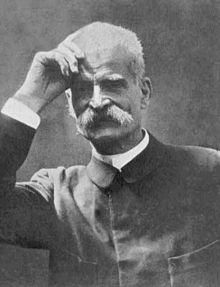Antonio Abetti
Antonio Abetti (born June 19, 1846 in San Pietro di Gorizia ( Gorizia ) (then Italian , now Slovenian ), † February 20, 1928 in Arcetri ( Florence )) was an Italian astronomer .
Abetti's birthplace belonged to the Napoleonic Empire until 1814 , was under Austrian administration between 1814 and 1919 and then fell to Italy.
Abetti was originally an engineer but turned to astronomy in 1868 after graduating from the University of Padua with degrees in mathematics and engineering. He worked at the Padua Observatory until 1893 , when he was appointed Director of the Arcetri Observatory and Professor at the University of Florence .
The Arcetri observatory, which was built in 1872 by Giovanni Battista Donati , was partially disbanded after his death. One of Abetti's first tasks was therefore to set up a telescope that he had built in the workshops of Padua. The objective of this telescope consisted of a two- lens achromatic system of 28 cm aperture and 5.33 m focal length , which had been manufactured in 1839 by Giovanni Battista Amici .
Abetti mainly worked on determining the positions of celestial bodies. During his time in Padua and Arcetri, he carried out numerous observations of minor planets ( asteroids ), comets and star occultations . During an expedition to Muddapur , (today Madhupur in Jharkhand , Bengal ), he observed the Venus transit of 1874 with a spectroscope .
Abetti was a member of the Astronomical Society , the Accademia Nazionale dei Lincei ( Rome ), the Royal Astronomical Society ( London ) and several Italian academies .
His son Giorgio Abetti (1882–1982) also became an astronomer and an important solar physicist .
Two lunar craters and the asteroid (2646) Abetti were named in honor of father and son Abetti .
literature
- Giorgio Abetti : Abetti, Antonio. In: Alberto M. Ghisalberti (Ed.): Dizionario Biografico degli Italiani (DBI). Volume 1: Aaron – Albertucci. Istituto della Enciclopedia Italiana, Rome 1960.
- Astronomical Society: Portrait Gallery of the Astronomical Society. Tullberg, Stockholm 1904, p. 7 digitized
Web links
- Publications by A. Abetti in the Astrophysics Data System
- Obituaries for A. Abetti in the Astrophysics Data System
| personal data | |
|---|---|
| SURNAME | Abetti, Antonio |
| BRIEF DESCRIPTION | Italian astronomer |
| DATE OF BIRTH | June 19, 1846 |
| PLACE OF BIRTH | San Pietro di Gorizia , Gorizia , Italy |
| DATE OF DEATH | February 20, 1928 |
| Place of death | Arcetri , Florence |
